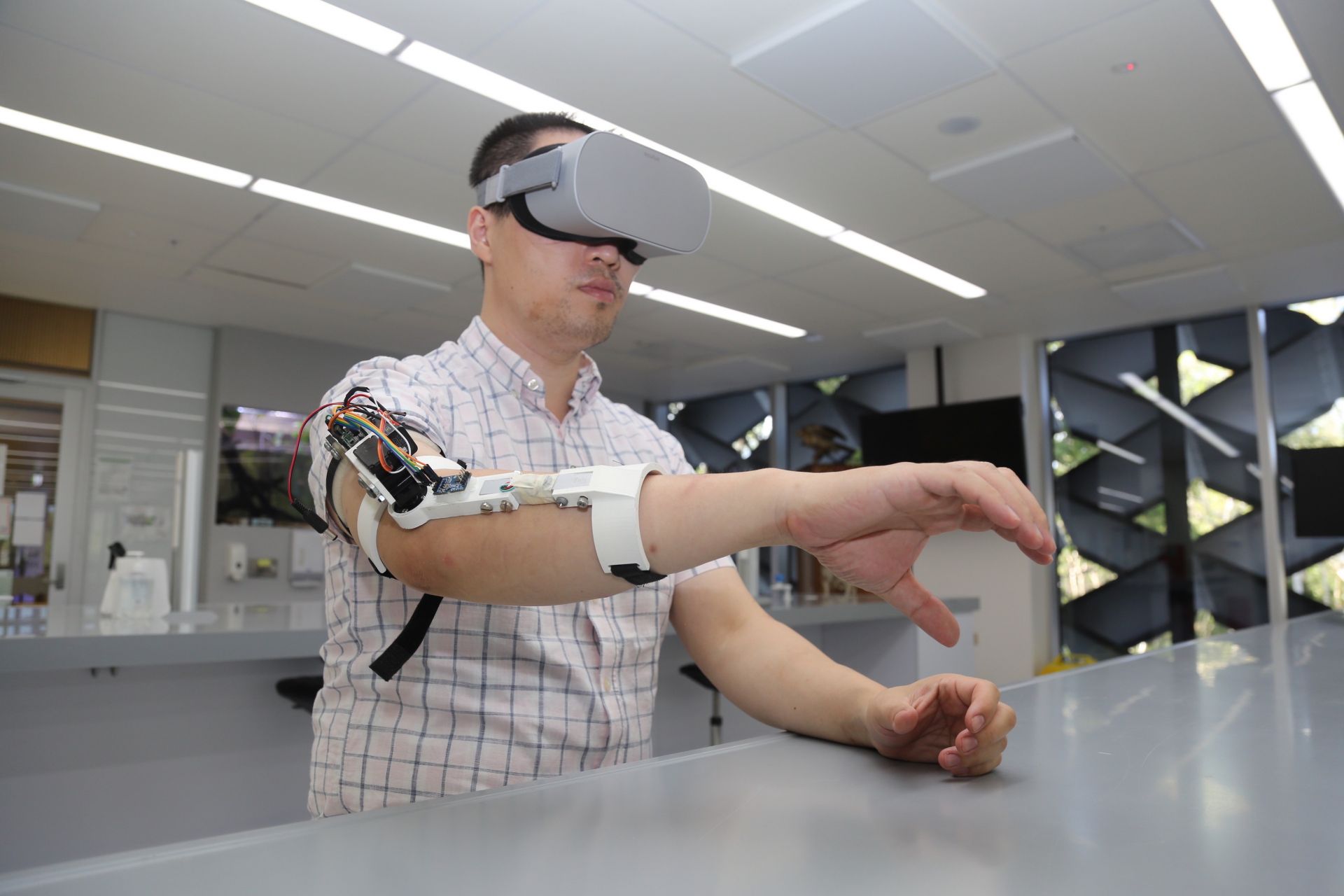Media Releases
Game-changing tool to help rehab patients

A James Cook University team developing a world-first device which keeps trauma patients focused on their recovery is a step closer to starting patient trials after being awarded a major prize.
The Bionics Challenge 2022 awarded $25,000 to the JCU team that’s developing a tool which uses an exoskeleton and virtual reality (VR) games to measure and increase a patient’s engagement and motivation during their rehabilitation.
The device is expected to dramatically improve the take-up and sustained use of rehabilitation technologies by road accident survivors suffering traumatic brain injuries.
“In the current rehabilitation industry, the biggest problem is trying to ensure that people follow the therapy and stay motivated,” said project lead designer and JCU cognitive scientist and robotics engineer Dr Shou-Han Zhou.
“By having a method of detecting how motivated a patient is, we then have a means of helping the clinician assess whether they need to change the exercise therapy or prescribe particular medications.”
While exoskeletons and VR computer games are already used to assist patients with rehabilitation, Dr Zhou said what makes JCU’s device unique is its ability to record online arm movements of a patient thanks to an algorithm embedded inside a chip connected to the exoskeleton.
“If we detect poor arm movements during an exercise using a VR game, which indicates a lack of patient motivation, we can tell the device to assist their movement or even provide other additional motivational features in the game,” he said.
“Through the sensors and motors in the exoskeleton, it will assist the person in completing their task.”
Dr Liza van Eijk, Dr Jonathan Connor, Dr Sara Brice, Dr Kenji Doma and Dr Omer Shareef join Dr Zhou as part of the JCU project team, with assistance from engineering students Kai Meloni and Curtis James.
Townsville Hospital, Smart Solutions Rehab Group and the Tropical Brain and Mind Research Foundation have also jumped on-board the project.
Dr Zhou said the team would spend next year further refining and testing the device before starting formal patient trials in 2024 at Townsville University Hospital with Dr Shareef and in Brisbane with Neurological Exercise Physiologist Blair Hunt.
Once further developed, Dr Zhou said the device could potentially have future applications in treating stroke victims and those suffering from Parkinson's Disease.
Hosted by Bionics Queensland, the Bionics Challenge 2022 is a unique Queensland-led competition designed to fast-track bionic healthcare solutions, and has awarded eight of Australia’s most exciting medical bionic discoveries a share in $300,000 of prizes and mentorship to help change the lives of those impacted by road trauma, related disabilities and chronic disease.
Delivered in partnership with the Motor Accident Insurance Commission, this year’s Challenge has awarded $200,000 in major category prizes and a total of $40,000 to a suite of promising, early-stage bionic innovation teams.
Bionics Queensland CEO and Challenge Founder Dr Robyn Stokes said the 2022 Challenge attracted some of the nation’s brightest minds and innovators who are committed to redefining the future of medical technology and human bionics for those living with road trauma.
“Our Bionics Challenge sees start-ups, R&D leaders and everyday innovators work ‘head-to-head’ with patients and end-users of bionic devices to jump-start new discoveries and improve on existing solutions to transform lives,” said Dr Stokes.
“Our Challenge prizes provide ambitious medtech innovators with a healthy ‘kickstart’ to fund their innovations and help propel them to market, accelerating the development of a new array of life-changing innovations for accident survivors and so many others awaiting new discoveries.”
Media enquiries: richard.davis@jcu.edu.au